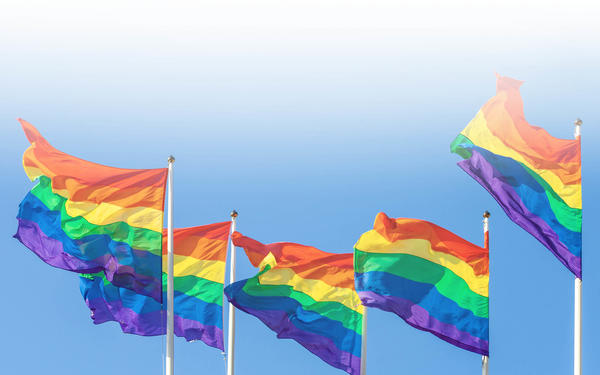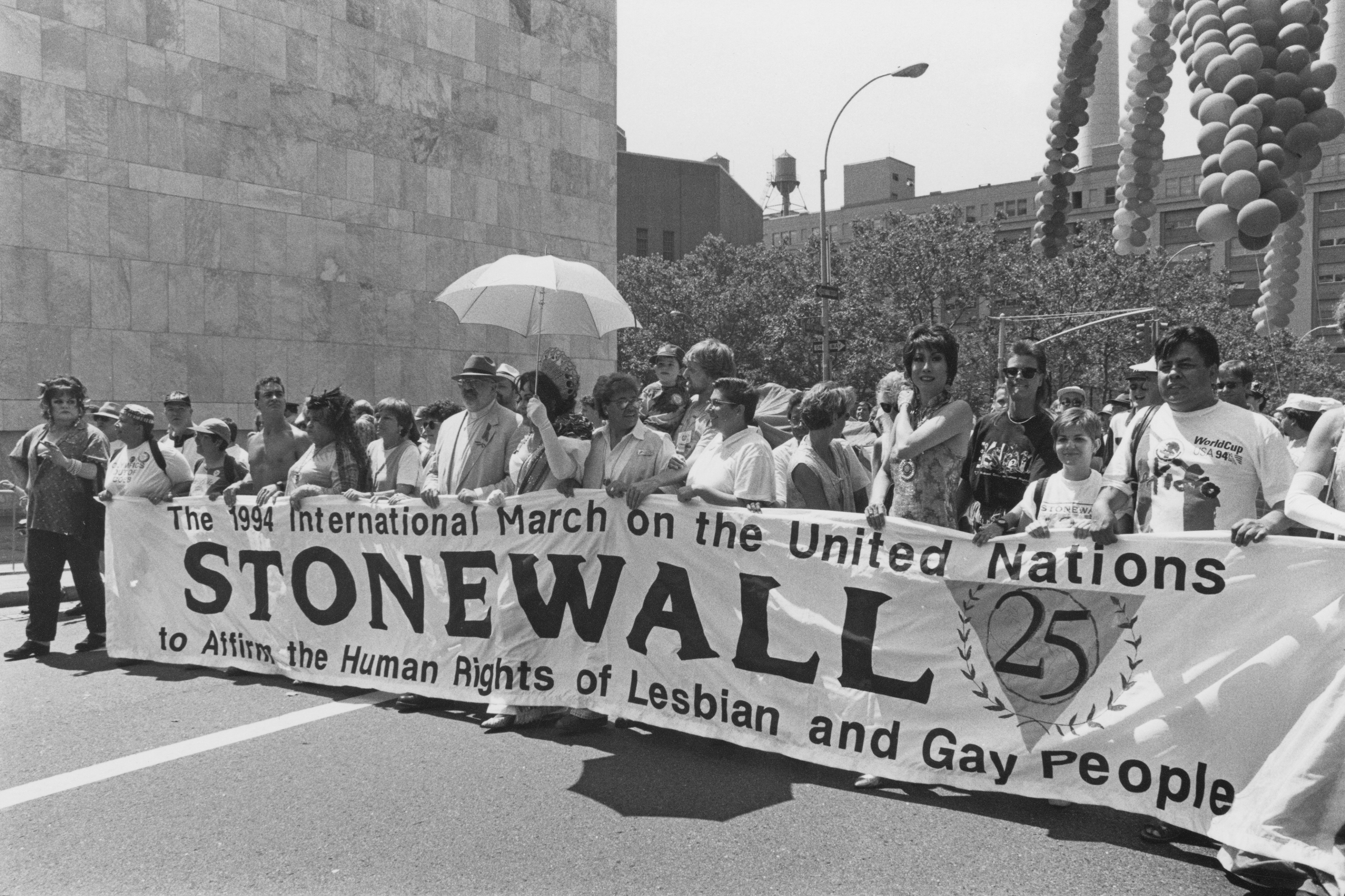Raising awareness and observing LGBTQIA+ history
At Cambridge University Press & Assessment we are passionate about contributing to changes that make society more inclusive, diverse and equal. We take pride in supporting colleagues around the world during national awareness events that underline this commitment. This February, we are highlighting the UK’s LGBT+ History Month, an annual, month-long observance of lesbian, gay, bisexual and transgender history. It is important that these historical events and issues are reflected in our products and our workplace culture.

Bringing LGBTQIA+ histories into the classroom
Mike Goddard, OCR’s lead subject advisor for history, is one of our team doing fantastic work to introduce LGBTQIA+ topics into our history qualifications and specifications. We caught up with Mike to find out more about what the team has achieved so far as well as goals for the future.
LGBTQIA+ history throws light upon much more than the history of minorities, or even the history of sexuality… it allows us to compare past and present attitudes to gender roles, civil liberties, social change and political activism.
So wrote Dr Marcus Collins, cultural historian at Loughborough University, in a blog OCR published last year to mark Pride month. Dr Collins has summed up one crucial reason why LGBTQ+ history is so important: it is (or should be) a fundamental part of the toolkit which we can use to understand social and political change. More inclusive history is, simply, better history.
There’s another major reason for its importance (well, there are many). We believe everybody should see themselves in the story. History is for everyone. If students only encounter heterosexual white men in their school history courses, significant proportions of them understandably will be turned off the subject, believing it not to be for or about them.
A diverse history curriculum is one step towards ensuring a more diverse history community, as well as a richer more meaningful history. This means we need to do more to encourage the inclusion of LGBTQIA+ stories, events and issues in our exam courses.

At OCR, we are working toward this, and have made progress. We were the first exam board to include the Stonewall riots of 1969 in our GCSE History A qualification, and our GCSE History B qualification has diversity as one of its guiding principles. Consequently, the opportunities to include LGBTQIA+ history are, uniquely, there throughout. For example, there is space in the Living Under Nazi Rule topic of our GCSE History B to bring in discussion of LGBTQIA+ history.
At A Level, where students have more choice, particularly through their coursework, we encourage them to consider researching LGBTQIA+ topics such as ‘How far was equality for homosexual people in Britain advanced between 1967 and 2014?’
As well as including more LGBTQIA+ stories in our history qualifications, we are also focusing on other subjects in order to be as diverse as possible. In 2021 we joined Penguin Book’s Lit in Colour campaign, which aims to explore how to increase students’ access to books by writers of colour and those from minority ethnic backgrounds. As part of this, we have reviewed our English Literature specifications to ensure there is a diverse and inclusive range of authors available for students to study.
Yet in a 2021 Historical Association survey, a staggering 87% of teachers disagreed that their GCSE course “allows sufficient scope to include the history of specific groups”, with regard to LGBTQIA+ history. This needs to change. So, we’re working with academics, including Dr Collins, to make the teaching of these underrepresented stories more accessible, to produce resources that can bring LGBTQIA+ histories into the classroom, and to ensure that these topics become firmly established as part of a rich curriculum that includes everyone.
Making exam processes more inclusive and diverse
After speaking with Mike, we took a look at how OCR’s examination processes work in practice.
When students register for OCR’s qualifications and examinations, they do not have to choose between male and female when stating their gender, as a non-binary option is available. As well as this, OCR doesn’t charge a fee for those who request a replacement exam certificate due to undergoing gender reassignment, after exams have been taken.
Other examples of inclusive and diverse processes at OCR are:
-
Diversity training is given to examiners who create exam papers, which will positively impact new papers from 2023
-
The creation of OCR’s equality, diversity, inclusion and belonging committee which works to ensure papers and exam materials are diverse and inclusive. Members of the committee include disability charity SCOPE, The Kite Trust, which supports the wellbeing of LGBTQIA+ young people in East Anglia, and the race equality think tank, The Runnymede Trust.
-
Sponsorship of the UK’s All-Party Parliamentary Group (APPG) on Diversity and Inclusion in STEM (Science, Technology, Engineering and Mathematics).
Contributing to a more inclusive, diverse and equal workplace and society
We are striving to be an open and inclusive workplace where all colleagues feel a sense of belonging. Our staff networks strengthen our equality, diversity, inclusion and belonging initiatives.
Our Pride Staff Network is for all LGBTQIA+ colleagues and their allies. The network members raise awareness of LGBTQIA+ topics internally, collaborates with colleagues to shape our policy, procedure and products, and engages and builds relationships with our external communities and groups around the world.
All colleagues at Cambridge University Press & Assessment are actively encouraged to volunteer and fundraise for local communities. As part of this initiative the Pride Staff Network has raised more than £1000 for the Albert Kennedy Trust, a charity that supports young LGBTQIA+ people aged 16-25 living in the UK who are facing or experiencing homelessness or hostile environments.
The Pride Network regularly holds internal events for colleagues marking events such as Asexual Awareness Week, Trans Awareness Week, Transgender Day of Remembrance and World Aids Day. The network is holding several events throughout February to raise awareness and to celebrate LGBT+ History Month.
Discover LGBTQIA+ histories through our publishing
Long before people identified as transgender or lesbian, there were female husbands and the women who loved them. Female husbands - people assigned female who transed gender, lived as men, and married women - were true queer pioneers.

If you would like to read more about LGBTQIA+ history, you can explore our "Pride Collection", a compilation of works that explore and discuss a range of LGBTQIA+ issues and topics. The above excerpt comes from Female Husbands, A Trans History, an award-winning book by Jen Manion that is included in the collection.
We also have a selection of works specifically focused on drama, theatre and performance studies which includes several articles that discuss LGBTQIA+ topics in the context of theatre, performance and the arts sector.
How are you marking LGBT+ History Month? Join the conversation @CambPressAssess
